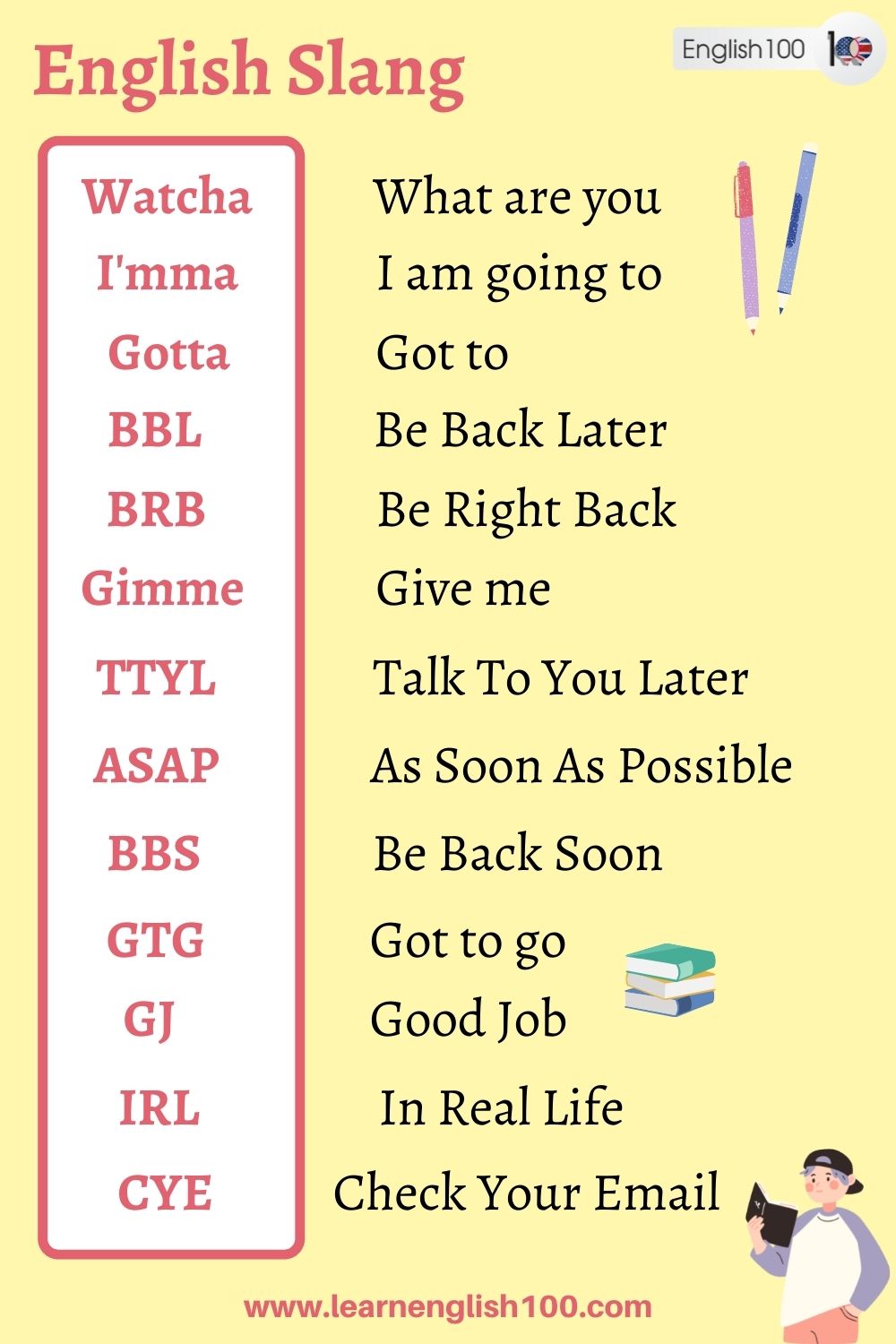
English slang words
The term “English slang words” refers to words or phrases in English that are used colloquially but do not have an accepted meaning in standard English. It is not generally considered a part of the English language, though it is sometimes used as such by native speakers of the language.
Examples of Slang
Watcha = What are you
eg. Watcha doing? = What are you doing?
I’mma = I am going to
eg. I’mma do what we want = I am going to do what we want.
Gotta = Got to
eg. I gotta perform well this time = I got to perform well this time.
BBL = Be Back Later
eg. Help me out here, I have another thing to attend to, I’ll BBL = Help me out here, I have another thing to attend to, I’ll be back later.
BRB = Be Right Back
eg. Wait here, BRB! = Wait here, be right back!
Gimme = Give me
eg. Gimme my wallet! = Give me my wallet.
TTYL = Talk To You Later
eg. I am busy at the moment, TTYL. = I am busy at the moment, talk to you later.
ASAP = As Soon As Possible
eg. Get that report back to me ASAP! = Get that report back to me as soon as possible.
BBS = Be Back Soon
eg. Don’t leave, I’ll BBS! = Don’t leave, I will be back soon!
GTG = Got to go
eg. I GTG! I have an appointment. = I got to go! I have an appointment.
GJ = Good Job
eg. This is amazing! GJ! = This is amazing! Good Job!
LMAO = Laughing My A** Off
eg. It is hilarious! LMAO! = It is hilarious! I am laughing my a** off!
IRL = In Real Life
eg. What you learn in school is all well and fine, but IRL things are different = What you learn in school is all well and fine, but in real life things are different.
CYE = Check Your Email
eg. CYE! You got the job! = Check your email! You got the job!
Why do we use slang words?
Slang is used to express things that are considered inappropriate by society or that go against specific rules. The phrase “talk like a pirate” makes use of the slang term for hairy chest, giving someone with this anomaly (having more body hair than you should) an informal description of their physical appearance.
Slang phrases make up the language in which we live; they not only help us to describe our acquaintances and experiences but also give us insight into the humor of the people living around us.
Slang is mainly used in conversation and texting to render it easier and faster. Its main objective is convenience. It does not exist in the dictionary, but there are nowadays specific dictionaries specific to slang and its use. It is much more flexible than formal or informal words since users may change their meaning at any given suitable time.
More often, slang serves social purposes: to identify members of a group, to change the level of discourse in the direction of informality, to oppose established authority. 1
FAQ
What is the most used slang?
The most used slang terms can vary significantly by region, culture, and generation. Slang is constantly evolving, and what’s popular today may not be tomorrow. However, as of my last knowledge update in January 2022, some commonly used slang terms in English included:
“Lit” – Used to describe something exciting or excellent.
“Fam” – A slang term for close friends or family.
“Savage” – Often used to describe someone who is bold or fearless.
“Flex” – To show off or boast about something.
“Yolo” – An acronym for “You Only Live Once,” often used to justify taking risks.
“Bae” – A term of endearment for a significant other, short for “before anyone else.”
“Bruh” – A casual way to address a friend or acquaintance.
“GOAT” – An acronym for “Greatest of All Time.”
“Squad” – Refers to a close-knit group of friends.
“On fleek” – Used to describe something that looks flawless or perfect.
What is a slang example?
A slang example is a word or phrase used informally and often within a specific group or subculture. Slang terms can have meanings that differ from standard language or may be used to express ideas or emotions in a more casual or creative way. Here’s an example of slang:
Standard English: “I’m really tired today.”
Slang Example: “I’m beat today.”
In this example, “I’m beat” is a slang expression for feeling very tired. It’s a more informal and conversational way to convey the same idea as the standard English sentence.
Slang can vary widely by region, age group, and subculture, so it’s important to be aware of the context and audience when using slang terms.
In conclusion, slang is not just a collection of words and phrases; it’s a living, breathing aspect of language that reflects the spirit of the times. Embracing slang can lead to a deeper understanding of cultures and communities, making it an essential aspect of linguistic exploration and appreciation. So, whether you’re using slang to connect with peers, understand popular culture, or simply express yourself, remember that language is a vibrant and ever-changing entity, and slang is one of its most captivating facets.
References:
